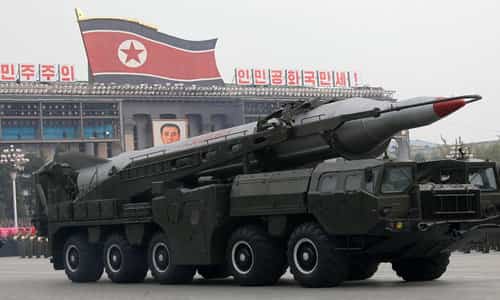What The Crisis Means: North Korea, Nukes And Islamists
 By Ryan Mauro/Clarion Project August 12, 2017
Share this article:
By Ryan Mauro/Clarion Project August 12, 2017
Share this article:
North Korea is officially a communist, Stalinist dictatorship, but
that hasn't stopped it from crossing the ideological divide to embrace
Islamist regimes and, reportedly, even jihadist groups.
The
latest crisis between North Korea and the U.S. appears separate from
the war with Islamism, but there are 10 ways it overlaps.
The
U.S. and allied intelligence services now believe North Korea has
miniaturized its nuclear warheads to fit onto its intercontinental
ballistic missiles and has the potentially up to 60 nuclear weapons.
This
was seen as an undeclared "red line" and prompted President Trump to
threaten to bring "fire and fury like the world has never seen" if North
Korea's verbal threats continue; a benchmark North Korea immediately
crossed by announcing it was considering a nuclear strike on the U.S.
territory of Guam, where 6,000 U.S. troops are stationed. Another 28,000
U.S. troops are in South Korea and 49,000 in Japan.
North
Korea threatened to attack Guam in 2013 and its bombastic rhetoric is
practically a daily occurrence, but North Korea's aggressive attacks
have increased in recent years including sinking a South Korean ship in
2010, an artillery barrage on a South Korean island that same year, a
cyber attack on Sony Pictures in 2014 and a bold assassination of a
political rival in a Malaysian airport using the VX biological weapon
earlier this year.
1.The Iranian and North Korean WMD programs should be seen as a single entity.
We must now assume that Iran likewise has the ability to miniaturize nuclear warheads onto ICBMs.
Iran
and North Korea have shared virtually everything when it comes to
ballistic missile and nuclear technology. One Iranian opposition group
claimed that Iran continued its nuclear program in spite of the nuclear
deal by simply outsourcing it to North Korea.
The
nuclear and missile tests are widely seen as being on done on behalf of
Iran with Iranian scientists on the scene for their occurrences.
Both
North Korea and Iran helped the Syrian regime pursue nuclear weapons,
resulting in the Israeli airstrike on Bashar Assad's nuclear reactor in
2007. Various reports indicate that Syria's nuclear program continued
thereafter, albeit on a smaller scale.
2.North Korea's Links to Hamas, Hezbollah and reportedly Al-Qaeda-tied terrorists in the Philippines.
In
2003, the government of the Philippines said that it captured documents
showing that the Moro Islamic Liberation Front, an Islamist group that
has had a relationship with Al-Qaeda in the past, paid $2 million to
North Korea for guns, ammunition and grenades and was looking to buy
mini-submarines. Another sale was reported in 2005 of 10,000 rifles.
In
2006, a federal judge ruled that North Korea is liable for damages
caused to American-Israeli citizens due to its material support for
Hezbollah. Iran sponsored North Korean assistance to help the terrorist
group by providing rockets and missiles and guidance on building its
sophisticated network of tunnels and bunkers. It said that Hezbollah
terrorists have been traveling to North Korea for advanced training
since the late 1980s.
In 2009, the UAE
intercepted over 2,000 detonators for Hamas' 122mm Grad rockets and
associated equipment. Later that year, Israel intercepted 35 tons of
rockets, RPGs, shoulder-fired missiles and equipment for surface-to-air
missiles from North Korea to Iran for delivery to the Hamas and
Hezbollah terrorist groups in Thailand.
In
2014, it was reported that Hamas was negotiating an arms deal with North
Korea worth hundreds of thousands of dollars for missiles and
communications equipment and a down payment had already been made.
It
is strongly suspected that North Korea helped Hamas build its
sophisticated tunnel system that was used to attack Israeli civilians
and wage war in 2014 against the Israeli military.
The
Hamas terrorist group openly thanked North Korea for its political
support against Israel this year. The North Korean regime (DPRK) pledged
to "mercilessly punish" Israel for its leaders' accurate description of
the ruling leader as a "crazy."
The DPRK said
it "fully supports" the Palestinian jihad to have an independent
country and to seize Jerusalem, a vague statement that seems to imply
material support.
We should expect such sales
to increase as sanctions force the North Korean regime to look for more
revenue, as well as ways to retaliate against the U.S. and its allies.
The
North Korean regime has no problem selling arms to Islamists and is not
a target of the jihadists, so we shouldn't be surprised if North Korea
goes so far as to directly sell weapons and expertise to groups like
ISIS and Al-Qaeda.
3.North Korea has threatened to sell nuclear weapons to other countries and even international terrorist groups.
It now has up to 60 nuclear weapons, a number that could grow to 100 by 2020.
In 2005, North Korea threatened to sell its nuclear weapons to terrorist groups "if driven into a corner."
North
Korea has a surplus of nuclear weapons. It can afford to sell off a few
if it feels confident that U.S. intelligence will be unable to identify
and intercept the shipment; a fair assumption given our recent
underestimations of their capabilities.
Past
customers for Iranian missiles and arms include Iran and its puppet
Assad regime in Syria; Yemen, which is now working with Salafists and
the Muslim Brotherhood; Pakistan; Eritrea, which has supported
Al-Qaeda's branch in Somalia; the Somali government; Cuba and possibly
Venezuela.
There are suspicions that Turkey is looking to build nuclear weapons, as an imam close to President Erdogan is encouraging this.
4.Joint cyber warfare programs with Iran.
Both
Iran and North Korea have launched cyber attacks on the U.S. and its
allies with minimal consequences. There is strong evidence that the two
rogue states' programs are interconnected and they are even launching
joint cyber attacks together.
5.Radical Islam will seep into an unstable North Korea.
As
soon as a closed society begins opening up, the promoters of Islamism
get to work. A relevant example is how Saudi Arabia, Qatar and Turkey
are in a mad dash to lead the Muslim community in Cuba.
In
2010, Pew estimated there are 3,000 Muslims in North Korea, a 300%
increase from 1990. It projects that number will stay about the same
until at least 2030, but that is doubtful as globalization inevitably
penetrates North Korea and exposes more citizens to Islam.
The
most jihad-prone forms of Islam in North Korea are already leading the
way. In 2013, North Korea allowed Iran to build the country's first
mosque, located at the Iranian embassy.
The
extreme anti-Americanism and anti-democracy thought that is instilled in
the population means this Muslim population will probably be inclined
towards radicalism.
6.Regime instability will be a gold mine for terrorists, criminals and rogue states.
The
regime is bound to become more unstable over time and that could
increase as international tension rises and the U.S. potentially tries
to undermine Kim Jong-Un. North Korea is armed to the teeth with deadly
expertise, conventional weapons and WMDs, all of which will be sold off
by their hungry protectors or abandoned in the event of extreme
upheaval.
All kinds of black market criminals,
terrorists and governments will be trying to snatch up whatever they
can. For Islamists, they will look to the Muslim population for
logistical support.
Iranian operatives are already in the country, as may be Hezbollah terrorists.
ISIS
is on the rise in the Philippines, the Islamic terror threat is
increasing in South Korea and it's only a matter of time before China's
Muslim-majority Xinjiang Province becomes a jihadist front.
North
Korea is isolated now, but don't assume that Islamists won't be able to
enter the country and make contact with its black market as the regime
becomes unstable.
7.Reported plans for a two-front war by Iran, Syria and North Korea.
There
have been intelligence reports since the early 1990s indicating that
Iran, Syria and North Korea had a deal to force the U.S. into a
two-front war if any one of them came into military conflict with
America. Since then, these countries have only grown stronger, we have
grown weaker, and their friendships have grown tighter.
Of
course, we do not know if such an agreement exists today and we also do
not know if they are loyal enough to honor it if it exists. However,
the reported historical precedent must be taken into account and it is
certain that Iran, Syria and North Korea will at least take limited
measures to assist each other in the event of military conflict.
And
if Iran and North Korea have aspirations to commit aggression, there's
no better time to act than when the U.S. is preoccupied on another
front.
8.Bogging down the U.S.
If
the situation escalates, then the U.S. military--already suffering from
the sequestration--will be hard pressed for resources to maintain its
operations against ISIS, Al-Qaeda and the Taliban in Iraq, Syria and
Afghanistan, not to mention more limited efforts in places like Yemen,
Libya and the Philippines.
9.North Korean Terrorists Could Target U.S. Soil
It
is not out of the realm of possibility that North Korea will try to
launch saboteur/terrorist attacks on American soil, particularly against
those seeking to undermine Kim Jong-Un.
Earlier
this year, Kim Jong-Un used two assassins to murder a political rival
using the VX biological weapon in a Malaysian airport. Think about how
much of an escalation that is: A biological terrorist attack inside an
airport in a foreign country.
That means North
Korea has loyal operatives who can sneak such deadly substances into
other countries and are willing to risk their lives to commit murder on
Kim Jong-Un's behalf.
And the target was
another North Korean from the top of society. Such operatives would have
even less qualms about targeting Americans.
North Korea could collaborate with Islamist terrorists or criminal elements for an attack in America.
After
all, the Iranian Revolutionary Guards Corps hoped to hide behind
Mexican drug cartel members in its plan to kill the Saudi ambassador in
Washington D.C. by blowing up a diner.
10.The Worst of All Scenarios: EMP
Watch this Clarion Project short film from 2012
about the threat posed by a potential Electro-Magnetic Pulse attack by
Iran. North Korea has the same capability. A top expert on nuclear
weapons and EMPs, Dr. Peter Vincent Pry, has been sounding the alarm
that he believes North Korea is actually practicing carrying out such an
attack on the U.S.
Should that happen and the
attack succeed, North Korea will cripple the U.S. and perhaps win its
war against America. And even if the U.S. destroyed North Korea in
response, the jihadists will have won their war against America as the
country struggles to survive as Islamists rampage across the planet.
Originally published at The Clarion Project - reposted with permission.

No comments:
Post a Comment